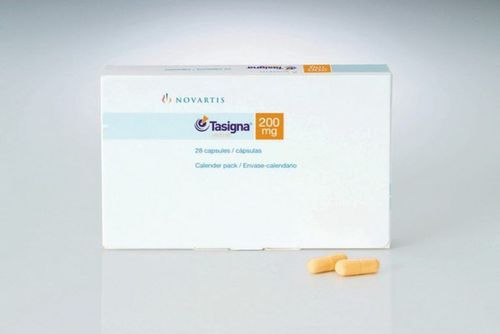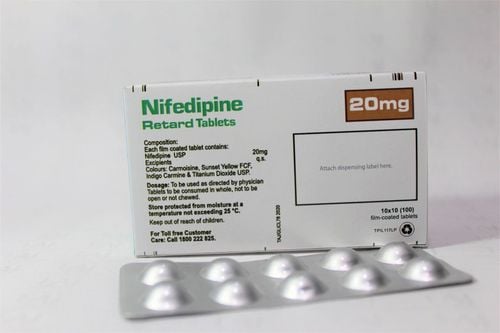This is an automatically translated article.
Carvedilol is a multi-mechanical neurohormonal antagonist, both a non-selective beta blocker and a vasodilator effect via alpha receptor blockade. This active ingredient is present in the drug Coryol 6.25 mg.
1. Indications of the drug Coryol 6.25mg
Coryol 6.25 mg is a product of KRKA, D.D., Novo Mesto, this is a drug containing the active ingredient Carvedilol with the content of 6.25mg. Coryol 6.25 mg is indicated in the treatment of the following cases:
Hypertension, can be used alone or in combination with other drugs, especially often in combination with thiazide diuretics; Mild or moderate congestive heart failure due to ischemia or cardiomyopathy, in combination with digitalis, diuretics, ACE inhibitors to reduce disease progression; Treatment of angina pectoris.
2. Mechanism of action of Coryol 6.25 mg
Carvedilol in Coryol 6.25 mg is a racemic mixture of optical isomers S(-) that antagonizes the beta-sympathomimetic system. Thus, carvedilol is a multi-mechanical neurohormonal antagonist that inhibits the B-adrenergic system (beta blocker) non-selectively. At the same time Coryol 6.25 mg has vasodilator properties due to selective alpha-adrenergic blockade.
The mechanism of antihypertensive treatment of Coryol 6.25 mg consists of vasodilation, mainly by selective alpha receptor blockade leading to a decrease in peripheral vascular resistance, and nonselective beta receptor blockade. Both the vasodilator and beta-blocker effects occurred at the same dose.
Clinical studies have demonstrated that a combination of alpha and beta blockers results in a slightly decreased or unchanged heart rate at rest, maintaining ejection fraction and renal and peripheral blood flow.
3. Dosage of the drug Coryol 6.25 mg
To prevent and limit the risk of orthostatic hypotension, Coryol 6.25 mg is recommended to be taken with food.
Dosage of Coryol 6.25 mg:
Treatment of hypertension: Initially 12.5 mg (2 Coryol 6.25 mg tablets), orally once a day, after 2 days increase to 25 mg/day; Or patients can start with 6.25 mg/time, 2 times a day, after 1 to 2 weeks increase to 12.5mg x 2 times a day; In case of necessity, the dose can be continued to increase at least 2 weeks apart, to a maximum dose of 50mg/day orally in 1 or in divided doses; Elderly hypertensive patients can only take 12.5mg/day once a day, feel the effect; Treatment of angina: The starting dose is 12.5 mg/day, divided into 2 oral doses. After 2 days can increase to 25mg / day, divided into 2 oral doses; Treatment of heart failure: The recommended dose is 3.125mg (1⁄2 Coryol 6.25mg tablets) x 2 times daily for 2 weeks. Then, if tolerated, can be doubled to 6.25 mg (1 Coryol 6.25 mg tablet) x 2 times daily; The dose may be further increased if tolerated by the patient, at least 2 weeks apart to the recommended dose of 25 mg orally 2 times a day for patients under 85 kg or 50 mg/day in 2 divided doses with patients weighing over 85kg; It should be noted that prior to initiating Coryol 6.25 mg therapy for congestive heart failure, patients receiving cardiac glycosides, diuretics and/or ACE inhibitors must be stabilized on these doses. The risk of decompensated heart failure and/or severe hypotension was highest during the first 30 days of treatment; Idiopathic cardiomyopathy: 6.25-25mg twice daily. Coryol dose 6.25 mg in renal failure: No dose adjustment is necessary in this subject; Coryol 6.25 mg dose in liver failure: This subject is contraindicated to use Coryol 6.25 mg. Patients with an overdose of Coryol 6.25 mg may experience symptoms such as:
Symptoms of carvedilol poisoning include cardiac disorders, central nervous system toxicity, hypoglycemia and hyperkalemia.. The most common cardiac symptoms are hypotension and bradycardia; Atrioventricular block, intraventricular conduction disturbances, and cardiogenic shock may occur with severe Coryol 6.25 mg overdose, especially when used with membrane blockers; Treatment: Including symptomatic treatment of epilepsy, lowering blood pressure, increasing potassium and lowering blood glucose; Bradycardia and hypotension resistant to atropine, isoproterenol, or to pacemakers may suggest glucagon.
4. Side effects of Coryol 6.25 mg
Coryol 6.25 mg is considered safe for patients with heart failure (mild, moderate and severe) or hypertension. However, some reports have noted the undesirable effects that may be encountered during treatment with Coryol 6.25 mg. Most of these were temporary in nature and resolved after a short period of time, most of which occurred at the beginning of treatment with Coryol 6.25 mg. The most common undesirable effects are dizziness (about 10%) and headache (about 5%) or some signs such as:
Muscle pain, fatigue, shortness of breath; Dizziness, orthostatic hypotension; Nausea . Uncommon side effects of Coryol 6.25 mg :
Slow heart rate; Diarrhea, abdominal pain; Thrombocytopenia, leukopenia; Decreased peripheral circulation, possibly syncope; Depression, sleep disorders; Constipation ; Skin urticaria, itching, psoriasis; Instructions on how to manage unwanted effects of Coryol 6.25 mg:
To minimize the risk of bradycardia and other undesirable effects: treatment with Coryol 6.25 mg should be started at a low dose and gradually increased. carefully monitor the patient's diastolic blood pressure and heart rate; Take carvedilol with food. The dose of Coryol 6.25 mg should be reduced if pulse rate falls below 55 cycles/min, avoiding abrupt discontinuation.
6. Contraindications when using Coryol 6.25 mg
Coryol 6.25 mg is contraindicated for use in the following cases:
Decompensated congestive heart failure (NYHA class III - IV heart failure) has not been treated with standard regimens. Bronchial asthma , patients with bronchospasm (which can lead to an asthma attack); Cardiogenic shock, severe bradycardia, second- or third-degree atrioventricular block; Symptomatic liver failure, severe liver failure; Hypersensitivity to any ingredient of Coryol 6.25 mg. Coryol 6.25 mg should be used with caution in patients with congestive heart failure treated with digitalis, diuretics, and ACE inhibitors because of the synergistic effect of causing hypotension and/and atrioventricular conduction may be slowed; Caution should be exercised in patients with non- or poorly controlled diabetes, as Coryol 6.25 mg beta blockers may mask hypoglycemia; Stop treatment with Coryol 6.25 mg when signs of liver damage appear; Coryol 6.25 mg should be used with caution in patients with peripheral arterial disease or thyrotoxic syndrome. Avoid stopping Coryol 6.25 mg suddenly, stopping the drug for 1-2 weeks. Carvedilol reduces alertness and therefore affects the patient's ability to drive or use machines; Use of Coryol 6.25 mg in pregnancy and lactation: Carvedilol has demonstrated clinical harmful effects on the fetus, therefore Coryol 6.25 mg should be used during pregnancy only if the benefit outweighs the potential risk. If possible, do not use Coryol 6.25 mg during the third trimester of pregnancy. Undesirable effects of Coryol 6.25 mg on the fetus such as bradycardia, decreased blood pressure, respiratory depression, decreased glucose - blood, hypothermia in newborns... Using Coryol 6.25 mg during pregnancy Lactation: Carvedilol may be excreted in breast milk.
7. Drug interactions of Coryol 6.25 mg
Like other beta-blockers, carvedilol may potentiate the effects of antihypertensive agents causing hypotension; Care should be taken when using carvedilol with antiarrhythmic drugs or calcium channel blockers such as verapamil or diltiazem because of the risk of conduction disturbances when used concurrently; Do not administer intravenous calcium channel blockers and antiarrhythmic drugs during treatment with carvedilol, discontinue treatment with carvedilol plus clonidine, should discontinue carvedilol several days before tapering the dose of clonidine; When carvedilol and digoxin are co-administered, peak steady-state concentrations of digoxin may be increased by approximately 16% in hypertensive patients, requiring increased control of digoxin concentrations when initiating therapy with Coryol 6.25 mg. Adjust dose or discontinue Carvedilol. Carvedilol enhances the hypoglycaemic effect of insulin and oral hypoglycemic agents, and symptoms of hypoglycaemia may be masked or reduced; Coryol 6.25 mg should be used with caution in patients receiving oxidase inducers such as rifampicin (due to decreased serum concentrations of carvedilol) or oxidase inhibitors such as cimetidine (due to serum concentrations of carvedilol). carvedilol bar may be increased).
Please dial HOTLINE for more information or register for an appointment HERE. Download MyVinmec app to make appointments faster and to manage your bookings easily.













